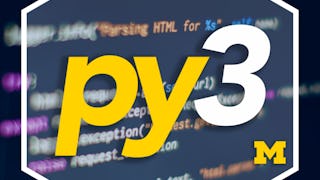This advanced-level course is designed to empower Python developers with the practical expertise required to build scalable, secure, and highly customizable web applications using the Pyramid framework. Learners will progressively move from foundational view configuration to sophisticated application structuring, integrating Pyramid’s flexible routing models, session management, authorization policies, and test-driven development techniques.

Discover new skills with 30% off courses from industry experts. Save now.


Recommended experience
Skills you'll gain
Details to know

Add to your LinkedIn profile
July 2025
19 assignments
See how employees at top companies are mastering in-demand skills

There are 6 modules in this course
This module introduces learners to the foundational concepts of the Pyramid micro-framework in Python. It explores the flexible, scalable architecture of Pyramid, emphasizing view configurations, rendering strategies, and the essential components required to build maintainable web applications. Learners will gain hands-on experience with decorators, route mapping, and view setup, building the groundwork for advanced application structuring in subsequent modules.
What's included
8 videos3 assignments
This module introduces learners to the critical aspects of managing static files and handling HTTP requests and responses within Pyramid applications. Students will explore how to register and serve static assets efficiently, override asset behaviors when necessary, and leverage Pyramid’s request and response objects to build dynamic, interactive web interfaces. By mastering these foundational mechanisms, learners will enhance the performance, flexibility, and user experience of Pyramid-based applications.
What's included
7 videos3 assignments
This module explores the core mechanisms behind maintaining user state, securing form interactions, and validating application behavior through testing in Pyramid. Learners will understand how to manage user sessions, implement flash messaging for user feedback, guard against CSRF attacks, and write both unit and functional tests using Pyramid’s testing utilities. The module also covers the foundational and advanced configuration patterns required to scaffold scalable and testable applications.
What's included
8 videos4 assignments
This module explores Pyramid's traversal-based routing system through the concept of resource trees, enabling developers to map URLs to Python object hierarchies. Learners will examine how to generate resource URLs, understand lineage relationships, and define access control mechanisms using ACLs and ACEs. The module also dives into the structure and configuration of authorization policies, providing a clear understanding of how permissions and security integrate within resource-based routing.
What's included
7 videos3 assignments
This module introduces Pyramid’s authentication mechanisms and explores how user identity and permissions are managed within web applications. It explains how to configure authentication policies, manage login sessions using remember() and forget(), and work with authenticated principals. The module also delves into traversal and hybrid routing patterns, showing how to combine URL dispatch with object-based resource traversal for greater control and flexibility in route handling.
What's included
6 videos3 assignments
This module explores advanced response handling and dynamic view control in Pyramid applications. Learners will delve into invoking subrequests for internal logic reuse, customizing not found and forbidden views for robust error handling, and enhancing request objects using custom request factories. Additionally, the module introduces response callbacks and Pyramid’s URL generation mechanics, enabling learners to fine-tune how responses are constructed and how dynamic URLs are produced. The techniques covered here equip developers to deliver flexible, maintainable, and consistent responses across complex web applications.
What's included
8 videos3 assignments
Earn a career certificate
Add this credential to your LinkedIn profile, resume, or CV. Share it on social media and in your performance review.
Explore more from Software Development
 Status: Free Trial
Status: Free TrialUniversity of Michigan
 Status: Free Trial
Status: Free TrialMicrosoft
Why people choose Coursera for their career





Open new doors with Coursera Plus
Unlimited access to 10,000+ world-class courses, hands-on projects, and job-ready certificate programs - all included in your subscription
Advance your career with an online degree
Earn a degree from world-class universities - 100% online
Join over 3,400 global companies that choose Coursera for Business
Upskill your employees to excel in the digital economy
Frequently asked questions
To access the course materials, assignments and to earn a Certificate, you will need to purchase the Certificate experience when you enroll in a course. You can try a Free Trial instead, or apply for Financial Aid. The course may offer 'Full Course, No Certificate' instead. This option lets you see all course materials, submit required assessments, and get a final grade. This also means that you will not be able to purchase a Certificate experience.
When you purchase a Certificate you get access to all course materials, including graded assignments. Upon completing the course, your electronic Certificate will be added to your Accomplishments page - from there, you can print your Certificate or add it to your LinkedIn profile.
You will be eligible for a full refund until two weeks after your payment date, or (for courses that have just launched) until two weeks after the first session of the course begins, whichever is later. You cannot receive a refund once you’ve earned a Course Certificate, even if you complete the course within the two-week refund period. See our full refund policy.
More questions
Financial aid available,





